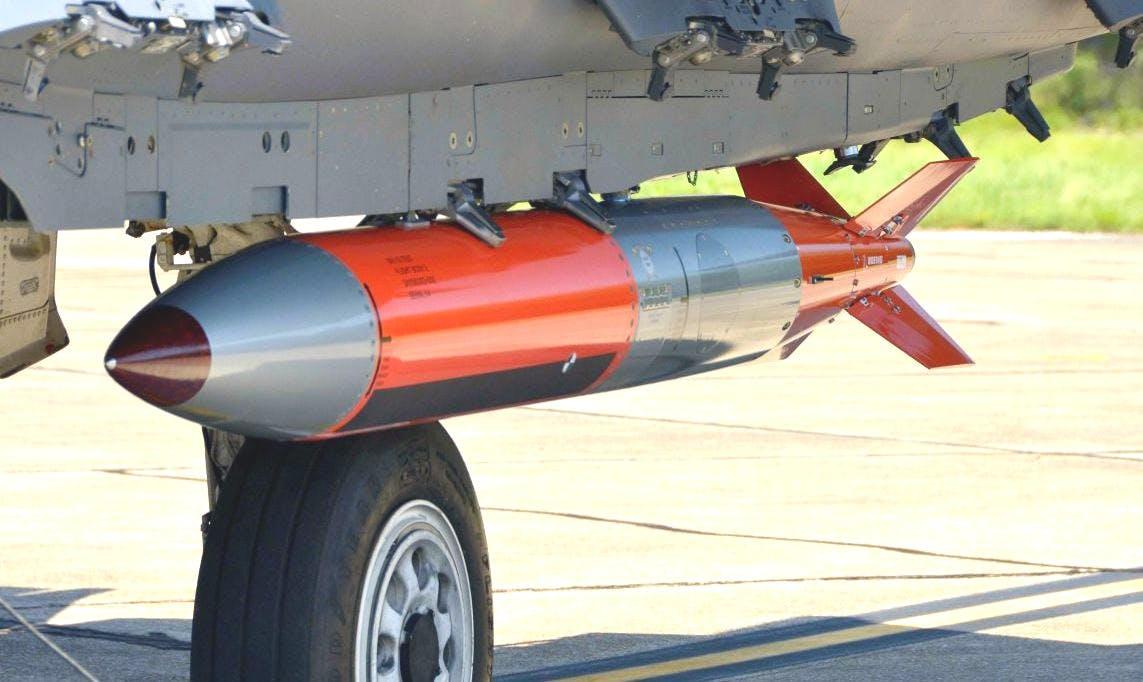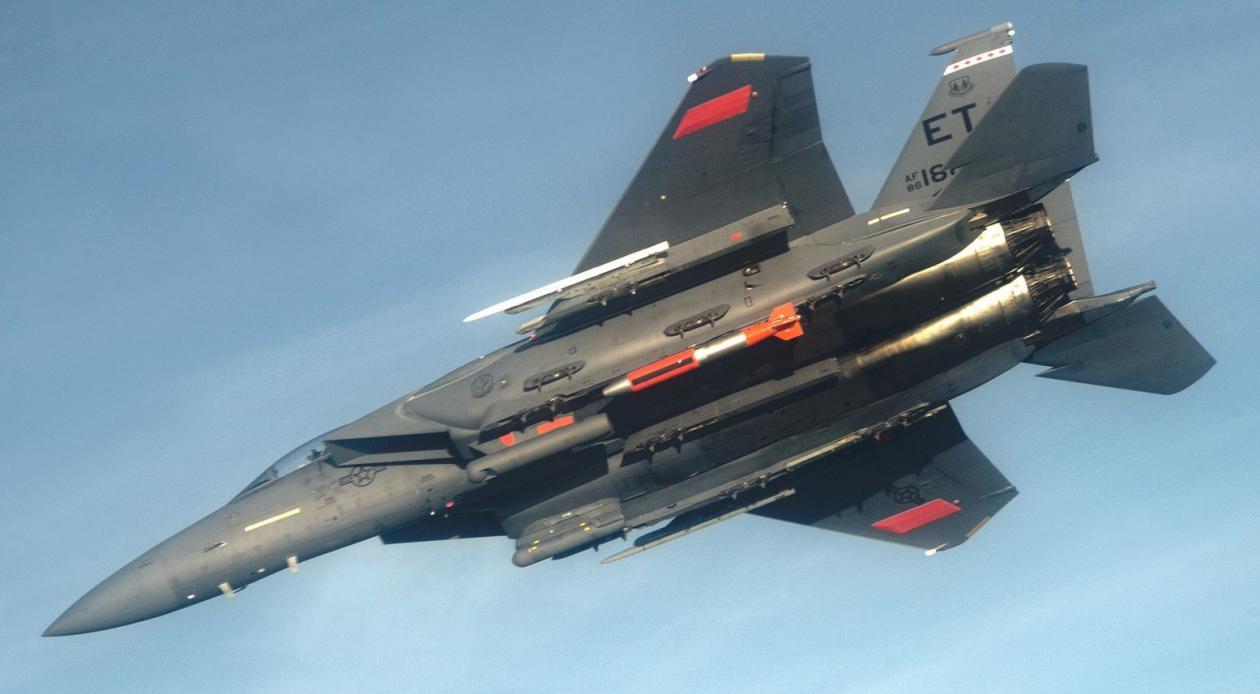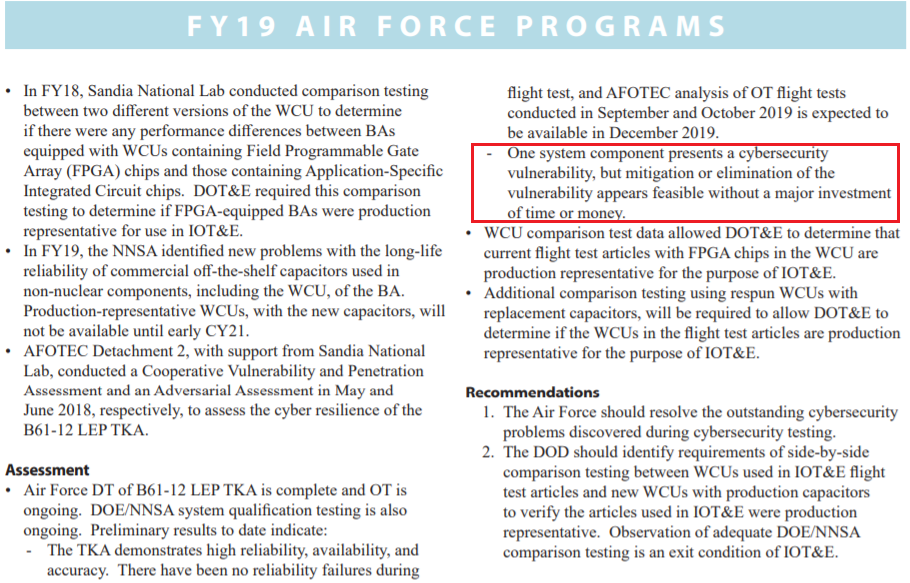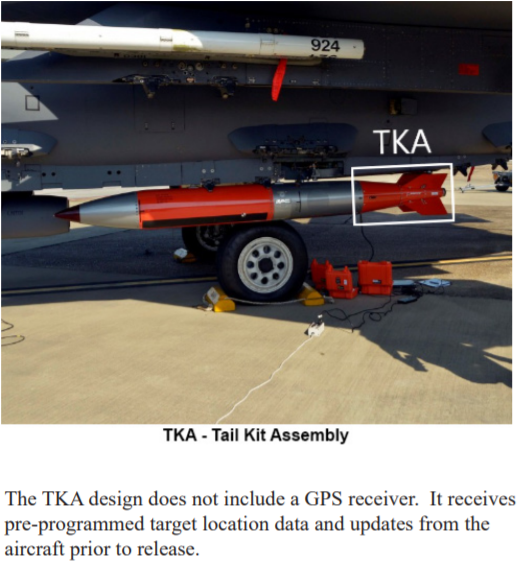Boeing’s New Nuclear Bomb Guidance System Has Software “Vulnerability”: Pentagon Report
Despite Boeing’s deep financial and reputational woes amid the 10-month 737 Max scandal, which have begun to also negatively impact the company’s Defense, Space, and Security sales — the company has actually long been working on some of the DoD’s most sensitive and key defense technology projects, including how to better “guide” nuclear bombs to their targets.
What could go possibly wrong?
Since 1968 the B61 nuclear bomb has been the primary thermonuclear gravity bomb in America’s nuke stockpile. The Air Force has since 2012 contracted Boeing to upgrade the bomb’s tail-kit assembly as part of a broader life-extension program to “refurbish, reuse or replace all of the bomb’s nuclear and non‐nuclear components to extend the service life of the B61 by at least 20 years, and to improve the bomb’s safety, effectiveness and security,” according to the Department of Energy.

Boeing has overseen a new tail kit guidance assembly since being awarded an initial $178 million contract in 2012, and subsequent ones since, which allows for air-launched nukes to utilize new “guided freefall capability” using four maneuverable fins (to be sure, and quite tragically, Boeing is all too experienced with “freefall” capabilities). Essentially the internal guidance system allows the upgraded B61 tactical nuke to glide to its target.
Prior reports of drop tests noted:
Military experts believe the weapon’s accuracy and variable power reduces the risk of collateral damage and potential widespread civilian casualties.
The B61-12 bomb features a tail kit from aircraft manufacturer Boeing which will enable a precision-guided trajectory.
But again, what could possibly go wrong?
Amid scandal and cover-up concerning Boeing top executives “cutting corners” on safety which appears to have been driven by “relentless cost-cutting” which tragically led to two 737 MAX jetliners crashing within five months, killing a total of 346 people, Boeing has been busy at work on safety updates to B61 nuclear bombs.

This deeply unsettling irony has yet to receive much in the way of broad media coverage.
Let’s hope for the sake of the survival of the human species there’s no relentless cost-cutting implemented by the Boeing higher-ups when it comes to guiding nukes to their intended targets.
Air Force awards $127.6 million contract to Boeing to begin production of the tail kit for the new guided B61-12 nuclear bomb https://t.co/KU37OW1QXC The tail kit triples the accuracy compares with existing B61 versions https://t.co/9Xd5o2ZPMo First bomb scheduled for March 2020. pic.twitter.com/MYsRXlmQRt
— Hans Kristensen (@nukestrat) April 30, 2019
On that note, Bloomberg reported Thursday the findings of the Pentagon test office’s annual report: Preliminary results indicate Boeing’s improved tailkit for B61 airdropped nuclear bomb “demonstrates high reliability, availability, and accuracy” during tests in September and October, Pentagon test office says in annual report.
“There have been no reliability failures during flight,” Director of Operational Test and Evaluation Robert Behler said in the just-released 2019 testing report.
But what’s that he adds?… software and feasibility issues as Boeing oversees nuke delivery “safety”?
“One system component presents a cybersecurity vulnerability” but mitigating or eliminating the vulnerability “appears feasible without a major investment of time or money,” Behler writes.
Not too comforting considering the events of the past year: a Pentagon oversight office writing in its review the words Boeing, nuclear bombs, reliability, cybersecurity vulnerability — followed by concluding lines of “appears feasible without a major investment of time or money.”
Recent ‘dummy bomb’ tests of the new tailkit dropped by a B-2 stealth bomber as well as from F-15E jets were reportedly successful.
From the Pentagon’s Office of the Director of Operational Test and Evaluation 2019 report.
The report notes further that “A unit equipped with the air-delivered B61-12 nuclear weapon plays a critical role in supporting the airborne leg of the nuclear triad for the United States and allies.” It adds: “The B61 thermonuclear bomb family is a key component of the current U.S. nuclear deterrence posture.” The report lists Boeing Defense, Space & Security company as the sole major contractor.
One thing is certain: if Boeing quietly outfits America’s nuclear bomb arsenal with its infamous MCAS system, it may all soon be over.
Tyler Durden
Fri, 01/31/2020 – 15:05
via ZeroHedge News https://ift.tt/38XfwEE Tyler Durden

